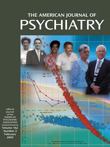To the Editor: We read with great interest the report by Dr. Veen and colleagues of a strong association between the use of cannabis and an earlier age at onset of schizophrenia in a first-contact study. Nevertheless, since the precise temporal link between psychosis onset and cannabis consumption is not known, it is difficult to definitively conclude from their data whether male subjects with the most negative and early-onset forms of schizophrenia were more prompted to use cannabis or whether cannabis actually precipitated psychosis.
In a homogeneous group of French Caucasian patients with schizophrenia (N=102, 66 men and 36 women), we found distinct results. Information was available from a direct standardized interview (the Diagnostic Interview for Genetic Studies), prospectively documented medical files (with urinary dose at index admission), practitioners, and family interviews
(1). Twenty-seven schizophrenic patients were characterized as “cannabis sensitive” since they had their first psychotic episode less than 6 months after the onset of cannabis use or less than 3 months after the onset of daily or heavy consumption and/or displayed prominent delusions or hallucinations when using cannabis. Cannabis-sensitive patients were slightly younger at the first psychotic episode than the remaining patients (mean=20.4, SD=3.1, versus mean=22.5, SD=4.9) (t=2.04, df=100, p=0.04). The positive schizophrenic symptom profile, evaluated with the Positive and Negative Syndrome Scale
(2) adjusted on the duration of disease, was significantly more marked in cannabis-sensitive patients (mean=20.8, SD=5.3, versus mean=15.9, SD=5.2) (F=17.8, df=1, 99, p=10
–4), even in men only or when the recent users (within the year, N=7) were withdrawn. No difference was seen regarding the negative symptoms (mean=23.6, SD=8.6, versus mean=22.4, SD=8.7) (F=0.73, df=1, 99, p=0.39).
Of interest, if we consider the use of cannabis as in the study by Dr. Veen et al., the difference in age at the first episode becomes nonsignificant (mean=20.9, SD=3.8, versus mean=22.6, SD=4.9) (t=–1.75, df=100, p=0.08). Again, there was no difference in the negative symptom profile (mean=22.7, SD=6.2, versus mean=22.7, SD=6.2, adjusted by the duration of disease), even in men, although the positive symptom profile remained significant in users compared to nonusers (mean=19.1, SD=5.4, versus mean=16.1, SD=5.4) (F=7.21, df=1, 99, p=0.009).
Several differences could explain the discrepancies between the two studies (study design, duration of disease, availability of cannabis, sociological and ethnic background). In addition, the current use or recent withdrawal of cannabis might have modified the symptom profiles in the study by Dr. Veen et al. We especially would like to stress the idea that the individual “sensitivity” or reactivity to cannabis might be a confounding factor in such studies and needs to be directly addressed by describing more precisely the relation between cannabis consumption and psychotic symptoms.

